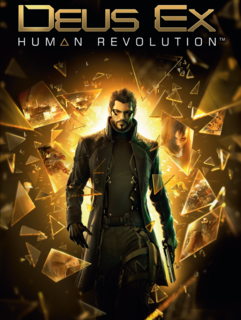A worthy successor to a beloved classic
The story is one of Human Revolution's highlights. The tale it spins is always believable and never degenerates into caricatures,cliches or predictability. Not only it does handle a weighty subject with the right nuance and gravitas, but it also has one of the best endings ever. You don't often see video games flirt with just the right amount of ambiguity, but Human Revolution does itself proud.
That the game was in production for a prolonged period of time shows in its visuals. Everything looks angular, low res and dated, although the game does try to spin it into a positive by weaving the engine's limitations into the art design. there are also substantial loading times that quickly becomes tiresome, especially as most missions require you to hoot between locations. What saves the game from being a visual letdown, however, is the superlative art direction. Using an unconventional mix of cyberpunk and European Renaissance era design design, combined with warm color tones, the visual appeal of the game outweighs it's technical blemishes. Environments are impressively detailed and filled with elements such as e-books, emails and other paraphernalia that add detail and literary depth to the universe. the voice acting is uneven, but that certainly doesn't apply to Michael McCann's score. The perfect blend of vocals, strings and electronica, this is a soundtrack you'll want to own. There are limited sets of augments to purchase using the praxis points you earn or purchase, but you never feel like you're carving out a unique character of your like in the first game. A large part of this disconnect is felt during the hugely disappointing boss battles. There's just one way to beat them; a huge letdown considering how much the game champions choice. The game still involves first exploration and combat, and the traversal of hub worlds filled with story quests as well as healthy number of side quests. While these hub worlds leave a lot to be desired, there numbers are sizable. This is still a long game by modern standards, but it would have been best to include more hubs to minimize backtracking. You can choose your approach to the game. There's a neat cover system in effect, with the camera pulling out to third person when you snap to an object. Guns feel meaty and the game rations out ammo just right. The grid based inventory management is a wonderful little time sink. There are NPC's to talk to within the hubs and even though the voice acting can be grating, you'll still click on each one of them because the story and dialogue are that good. Some of these conversations feel like mini boss battles, and will net you rewards and make your progress through a level much easier. Combine this with great writing and a fleshed out world, and every conversation becomes an insight in revelation.
There will be times when you'll find Human Revolution reliance on old school mechanics frustrating, but rising above that frustration is a mature story, impeccable production values and solid gameplay, all wrapped in a lengthy campaign. This is a world you'll find yourself investing in despite its flaws. Finish it, and you can't help but wish its digital inhabitants the best, because their world so closely mirrors ours.

